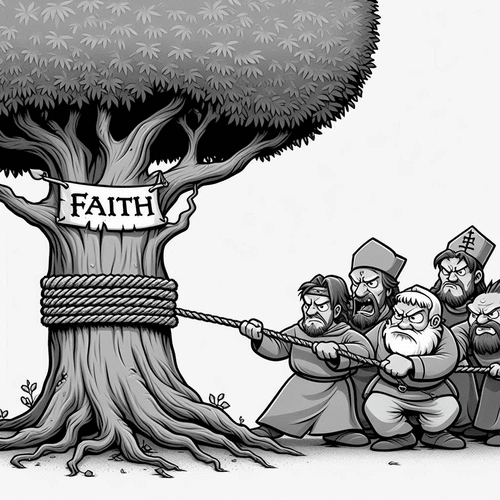How Jehovah’s Witnesses’ Key Teachings Differ from Biblical Doctrine
Though they call themselves a Christian denomination, Jehovah’s Witnesses (JWs) hold several beliefs that diverge from traditional biblical interpretations and mainstream Christian doctrines. Understanding these differences is crucial for those seeking to evaluate the JW faith. Consider with us how Jehovah’s Witnesses’ key teachings differ from biblical doctrine:
- Salvation by Works and Adherence to the Watchtower Society: Contrary to the biblical doctrine of salvation by grace through faith in Jesus Christ alone, JWs emphasize the necessity of works, including door-to-door evangelism and adherence to the teachings of the Watchtower Bible and Tract Society, for salvation.
- Denial of Christ’s Divinity and His Bodily Resurrection: While Christians affirm the deity of Jesus Christ, JWs believe He is a lesser divine being and not fully God. They reject the biblical teaching that Jesus is the incarnation of God and the second person of the Trinity. Instead, they teach Jesus is God’s first-born son, that
JWs also deny the bodily resurrection of Jesus Christ as described in the Gospels. Instead, they teach He was resurrected as a spirit creature.
Here’s more on how Jehovah’s Witnesses’ key teachings differ from biblical doctrine:
- Rejection of the Trinity: Unlike most Christian churches, JWs reject the doctrine of the Holy Trinity, denying the co-equality and co-eternality of God the Father, the Son (Jesus Christ), and the Holy Spirit. They view Jesus as a created being, not co-equal or co-eternal with God the Father. They deny personhood to the Holy Spirit and refer to Him as ‘it’ rather than ‘Him’, and as an impersonal force of God.
- Limited Atonement: While Christians hold that Christ’s atonement is universal and available to all who believe, JWs teach that only a select group of 144,000 “anointed ones” will receive heavenly salvation.
- Rejection of Hell as Eternal Punishment: JWs reject the biblical doctrine of eternal conscious punishment in hell for unbelievers. Instead, they hold to the belief of annihilationism, which teaches the wicked will simply cease to exist.
- Absolute Authority of the Watchtower Society: JWs are required to submit to the authority of the Watchtower Bible and Tract Society, which they believe is the sole channel through which God communicates with humanity.
- Failed Predictions of the End Times: Throughout their history, JWs have made numerous failed predictions regarding the timing of the end of the world and the Second Coming of Christ, undermining their credibility as interpreters of biblical prophecy.
- Prohibition of Blood Transfusions: Based on their interpretation of certain biblical passages, JWs refuse to accept blood transfusions, even in life-threatening situations, posing significant health risks.
- Discouragement of Higher Education: The JW organization actively discourages its members from pursuing higher education, viewing it as a distraction from their primary mission of evangelism and spreading JW teachings.
These key doctrinal differences highlight the significant divergences between JW teachings and widely accepted biblical interpretations held by the majority of Christian denominations.
Related Reads
Editor's Pick

The Throne-Room Vision: Who Did Isaiah See?
The scene is unforgettable: Isaiah stands in the temple, and suddenly the veil between heaven and earth tears open. He [...]

The Angel of the Lord: Can We Be Certain It Was Christ All Along?
Throughout the Old Testament, a mysterious figure appears: the Angel of the LORD. He speaks as God, bears God’s name, [...]
SUPPORT US:
Feel the Holy Spirit's gentle nudge to partner with us?
Donate Online:
Account Name: TRUTHS TO DIE FOR FOUNDATION
Account Number: 10243565459
Bank IFSC: IDFB0043391
Bank Name: IDFC FIRST BANK






